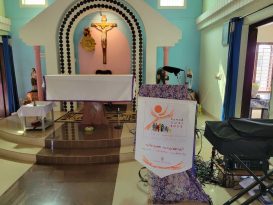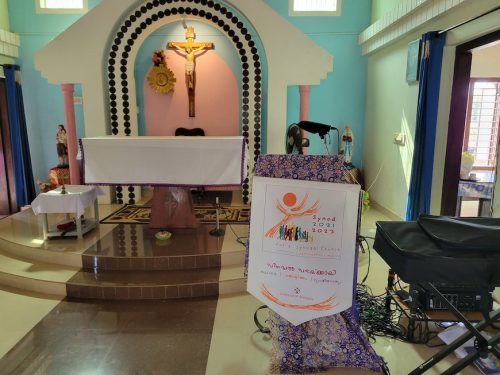By Barb Fraze | OSV News
ALAPPUZHA, India (OSV News) — An Indian diocese used its existing small Christian communities to train lay leaders to reach out to a wide variety of Catholics — including broken families — ensuring that everyone had a voice in the listening process for the upcoming Synod of Bishops on synodality. Some participants said they already have seen changes.
Almost 70% of parishes completed the initial reflection within three days, said Msgr. Joy Puthenveetil, vicar general of the Diocese of Alleppey.
“We have tried to let every family have the experience of the synod,” he told OSV News in early March. “The process of listening is what is important for the synodal church.”
Pope Francis and local bishops kicked off the listening and discernment process for the synod on synodality in October 2021; representatives of the world’s bishops and others will meet at the Vatican this October and in 2024 to discuss the issues discovered in the diocesan and continental phases of the process, all aimed at promoting unity, participation and a joint commitment to mission.
The Diocese of Alleppey has about 1,200 small Christian communities, and leaders of those communities trained about 70 members of the diocesan synod team.
Synod leaders prepared handouts for each family, asking questions such as “Is the parish priest listening to you,” as well as questions about their dreams for the church, said Msgr. Puthenveetil. Families responded anonymously and put their answers in the synod box in each parish.

“They expressed their honest opinions,” said Msgr. Puthenveetil. Although some people gave examples of good things happening, others gave examples of priests who did not welcome people, he said.
To give parishioners a taste of the synodal process, each parish synod group collected and synthesized opinions and discussed the results with members of the small Christian communities in a one-day session.
Using the diocesan commissions — such as education, family, youth, social justice and lay ministry — the diocese also reached out to other groups.
“Educators have a great role in forming the community,” Msgr. Puthenveetil said, so the diocese met with about 100 representatives of elementary, high school and college teachers, since the government was discouraging large gatherings during the COVID-19 pandemic.
Toward the end of the pandemic, the diocese created a social experience for elders, who shared their worries of being abandoned and concerns about changes in the mentality of new generations.
“They were very happy and recommended more experiences like that,” said Msgr. Puthenveetil.
Alleppey Visitation Sister Janet Klappanakal, a lawyer, was among those who reached out to broken families. She said families’ primary problems are money, followed by alcohol abuse.
Many of the families in the diocese are fisherfolk and, in the off season, they do not earn money, she said. In addition, often a family spends the dowry given by the bride’s family, then by the time the couple has one or two children, they are short of money. Sometimes the men start drinking; other times, they demand more money from the bride’s family, she told OSV News.
In addition, she said, if the man is Christian and the woman is Hindu, sometimes the woman takes the children and returns to her family and begins going to the Hindu temple. This creates confusion for the children, she said.
Although the diocese already had offered counseling sessions to troubled families, since the synod listening process, they have begun offering a “school of parenting,” under the auspices of the diocese’s family commission.
Maria Genevieve Isaac works as a volunteer in the music ministry at Our Lady of Mount Carmel Cathedral and also assists the sacristan in the bishop’s house. She said during the listening sessions, she was impressed by the priests and by Bishop James Anaparambil.
“It was their humble attitude to listen to the common laity, though holding a prestigious position. They were very thoughtful to know about our difficulties facing the ministry we are doing. The question that the church leader asked that impressed me was what we can do for the better functioning of the ministry, instead of imposing their decision and ideas,” she told OSV News.
Before the listening process, only one man and one woman were allowed to sing during Communion, she said.
“There was a complaint about it by the congregation and from the other members in the choir. This was discussed in the (synodal listening) meeting, and we were provided more mics and cables, new song books so that all can see; we formed a WhatsApp group to share the songs so that all can learn the song and all were allowed to sing. We choose the songs only which all the members present know as well as (are) able to sing. Before it was not like this. So now it sounds very beautiful,” she said.
Msgr. Puthenveetil said once results from all of Asia were consolidated, the priests gathered for a three-day consultation, since many of the answers involved priests. He said one concern was the need for more collaboration from the laity.






















